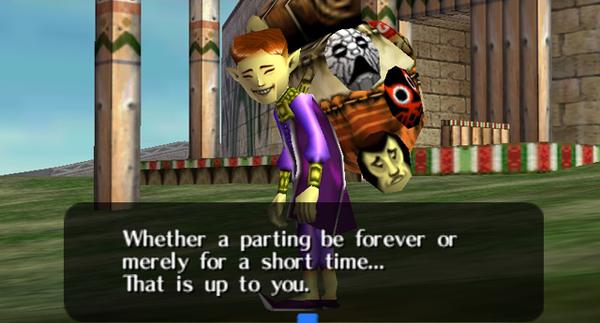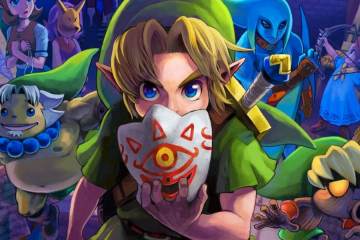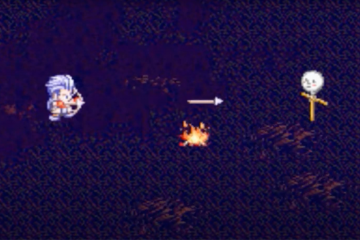The following is an entry in “A Comprehensive Theory of Majora’s Mask,” a series that analyzed the storytelling of Majora’s Mask from the time its 3D remake was announced to the time the remake was released. Find the full series here.
In the first installment of Line Analysis, I offered an analysis for the words with which the Happy Mask Salesman invites Link into the world of Termina: “You’ve met with a terrible fate, haven’t you?” Now, I take players to the other “bookend line” of the game, so to speak, with which the Salesman bids Link goodbye and vanishes (quite literally) from the world. After at last reclaiming Majora’s Mask (12:45 in the video), he says to Link: “Oh… So the evil has left the mask after all… Well, now… I finally have it back. Since I am in the midst of my travels… I must bid you farewell. Shouldn’t you be returning home as well? Whenever there is a meeting, a parting is sure to follow. However, that parting need not last forever… Whether a parting be forever or merely for a short time… That is up to you. With that, please excuse me… …But, my, you sure have managed to make quite a number of people happy. The masks you have are filled with happiness. This is truly a good happiness.”
In principle, my mode of analysis will take the same form as when I discussed “You’ve met with a terrible fate, haven’t you?”: first assessing the speaker of the line; then the intended audience of the speaker’s words; then the relationship between speaker and audience; the content of the line itself; and, finally, a synthesis of all prior components. However, since this moment shares some important features with the earlier-analyzed line — namely, that the Salesman is the speaker and Link is the spoken-to, I will be glossing over some argumentation that I have already done, linking to the relevant articles where necessary.
The payoff for this line, and the place it establishes for the player both within the context of Termina and beyond, might just be bigger than you expect.

Speaker
I quote from my previous line analysis: “I analyzed the Happy Mask Salesman last time, and argued that he functions as an entity that is metaphysically adjacent to Termina, and is responsible for Link’s agency, Termina’s fatalism, and Termina’s moral artifice. Not only is he generally crucial to the architecture of Termina, but he is also crucial to Link’s capacity to engage with Termina, both because of his teaching Link the Song of Healing and because of the motivational force of ascribed moral valence. We might say, then, that the analysis describes the Salesman as a speaker who both creates the problem of Termina — that is, the plot of the game — and prompts Link to solve it — and, to put it another way, motivates the player to play the game.”

Audience
Recall that in my prior line analysis, I argued that the Salesman, in speaking to Link, speaks both to Link and to the player. The major line of justification for this interpretation is that it explains the contingent nature of Termina as a closed system (read: universe) by directly defining its existence in terms of the player’s choice to encounter it. Because the Salesman, who serves as a metaphysical determinant of Termina, is again speaking to Link, it is fair to once again define his audience as ‘Link + player’. It’s also worth noting that here, the Salesman speaks to Young Link, the agent, rather than Cursed Deku Link, who, as I have described previously, lacks agency.
Speaker-Audience Relationship
In the last analysis, I described a relationship in which the Salesman framed the quest and means by which Link and the player encounter Termina; I went so far as to remark that “it isn’t apparent that Link could enter Termina without encountering the Salesman.” I think that at this juncture it will prove useful to say a word or two more about the relationship between the Happy Mask Salesman and the player. The reader may ask herself: “With a Terrible Fate, you said that the Happy Mask Salesman is not Termina’s God, but you also defined him as a metaphysically adjacent entity which is responsible for the brunt of Termina’s architecture. How in the world is such a being not God?”
It’s a fair point, and one which I think is worth answering more directly, because the answer draws out what’s at stake in both the Salesman’s first words and his last words. In my article analyzing the Salesman, I credited him for three specific dimensions of Termina: the world’s definitional existential risk (i.e., Majora’s Mask, wielded by Skull Kid); Link’s intra-timeline agency, as facilitated by the Song of Healing; and the artifice of evil imposed upon Termina. What I failed to underscore in this account of the Salesman is that he is a very specific facilitator of Link’s agency within Termina; so, although it is he who grants Link the degree of choice within the realm of Termina, it is not he who fundamentally is responsible for Link being an agent in the first place — that state of agency, as we have discussed before, is the result of Link serving as the conduit for the player to enter into the world. It is the player whose agency external to the world of Termina is conveyed unto Link, rendering him an agent; the Salesman merely facilitates that agency within Termina.
In my own studies, I often like to work through conceptual models graphically. To that end, and bearing in mind that I am by no means a visual artist, I offer a diagram of this model of Termina.


Figure 1.1 describes the entire universe of Termina in terms of a 3-dimensional narratological space: the z-axis describes the main plot of the game, such that Link moving further in the positive z direction signifies his advancing in the main plot (this happens by completing story events such as liberating a giant). The (x,y)-plane describes what I call ‘available paths of exploration’, which really just refers to any action available to Link that does not advance the main plot (think of side quests, farming rupees, playing mini-games, etc.). Each line segment in Figure 1.1 describes a single three-day timeline within Termina; such timelines can advance at any angle from a line that only changes in its z-coordinate (i.e., if Link were to do nothing for three days except for advancing the main plot) to a line that only changes in x and y coordinates (i.e., if Link were to take three days to only explore Termina in ways that did not at all advance the main plot). The circles, highlighted in Figure 1.2, describe the total set of available vectors by which Link can move in the universe of Termina. Ostensibly, Link has multiple vectors available to him almost all of the time, and so there is no reason for each Termina timeline to be a straight line instead of curved; I have only drawn the timelines as straight for simplicity’s sake.
If we consider Termina in terms of this three-space, then we can more precisely define the metaphysical roles played by the Salesman and the player. I have said that the Salesman frames the main plot of the game and also that he serves to define the scope of Link’s agency within Termina; what this means is that he defines the upper z-bound of the universe (i.e., the course of its main plot) and that he enumerates the available vectors with which Link can proceed through the universe (i.e., Figure 1.2).
To test the limits of the Salesman’s role, suppose that Link entered Termina and met the Salesman, but lacked the agency afforded him by the player. Theoretically, the entire main plot would still exist, and Link would still have all the paths described by the vectors of Figure 1.2 afforded him; yet this would only be a world of potentials and an apocalypse, because Link would lack the agency to pursue any of these vectors; more to the point, he would lack the capacity to play the Song of Time and instantiate any three-day cycles beyond the very first one. There would be no conception of three-day cycles; instead, there would be only three days in Termina, followed by the apocalypse.
Now, let us turn to the player. Certainly, the player, as the source of agency for Link the Avatar, is able to choose vectors and perpetuate the existence of the universe of Termina beyond three days; if you’ve been following my analysis, then this is nothing new. But something else is apparent from this model, which refines my claim that the universe of the game “cedes authority to the player”: suppose that the Salesman defines the outer bounds of Termina in the (x,y,z) directions all — now, it’s not apparent that he could define the x and y bounds, but it seems plausible that the shape of the rest of the universe might be subordinate to the main plot. Either way, we will see in a moment that this is a technical point that can be worked out later, and is not presently crucial to analysis.
Like the vectors of movement which the Salesman affords Link, this universal bounds establish a domain of potential: all possible timelines of Termina exist within the confines of these outermost limits. Yet these bounds fail to, of themselves, establish any reality: for the world of Termina, as I have said before, depends upon the player encountering it in order to exist. The diagram shows us why: the actual universe of Termina, as described by the total set of timelines undertaken by the player from the game’s inception to its conclusion, is represented by the chain of line segments traveled by Link in his exploration of Termina. Link moving along these lines is only possible by his choosing which vectors by which to move. Just a moment ago, I explained that choosing which vectors by which to move is dependent upon the agency conferred to Link by the player. It follows that the player, in a very real sense, determines the actual universe of Termina.
I’m reluctant to say that this argument implies that the player is God. What I would rather say is this: even if the Salesman gives the player the metaphysical building block to work with, it is the player who ultimately creates the world of Termina, by entering into its narrative in the way described above. So we might say something along the line of this: the Salesman and the player are both demiurgic in nature, but the determining metaphysical authority is vested in the player.

Line Content
That might have seemed like a long digression from the task at hand, but I think we will find that a precise definition of the Salesman-player relationship leads to an interpretation of the Salesman’s last words falling easily into place.
Firstly, we can describe the Salesman’s superficial meaning, if only to put it aside. The Salesman, having recovered Majora’s Mask, notes that the source of evil within it (i.e., Majora) is gone, and prepares to leave. He suggests that Link does the same, but advises him that saying ‘goodbye’ can always be taken as saying ‘until we meet again’, because we can always cross paths with those people we have left behind, if we desire to do so. He admires Link’s masks as evidence that Link has made many people happy, and then departs, vanishing from the world.
Somewhat trite, but certainly touching.
Moving on, let’s superimpose the theses we’ve derived from analysis so far to see if we can glean more from the Salesman’s words. I’m going to parse the Salesman’s little speech into three major sections:
1. “Oh… So the evil has left the mask after all…” We’ll look at this line in relation to the thesis of metaethical nihilism with which I’ve been working from early on, and in relation to the artifice of morality imposed by the Salesman on Termina.
2. “Well, now… I finally have it back. Since I am in the midst of my travels… I must bid you farewell. Shouldn’t you be returning home as well? Whenever there is a meeting, a parting is sure to follow. However, that parting need not last forever… Whether a parting be forever or merely for a short time… That is up to you. With that, please excuse me…” This seems like a big section of text, but the brunt of it is a single theme: encounters and departures. We’ll approach this in particular using the metaphysical model articulated above.
3. “But, my, you sure have managed to make quite a number of people happy. The masks you have are filled with happiness. This is truly a good happiness.” This last section will return us to the realm of temporal afterimagery, and will raise some more questions of ethical justification.
Beginning with Section 1: recall from Part III of my analysis of the Song of Healing that I argued for the artificial perception of evil within Termina originating from Majora. I quote the relevant section: “it is useful to think of ‘Majora’ [the entity] as identical to the game’s concept of evil. Not only can this explain the Happy Mask Salesman’s description of the force of Majora’s Mask as simply ‘evil,’ but it also accounts for the superficial moral valence present throughout Termina… This conception of Majora has the additional benefit of framing the driving conflict of the game’s story as friction between the apparently moral and the actually amoral. The artifice of evil, on my reading, is congruent to Majora’s Mask threatening Termina, a world in which, I have argued, morality does not exist. This friction explains why the problems of Termina on a regional scale are presented as a loss of natural order… Just so, the instantiation of morality fundamentally clashes with the natural metaphysics of Termina, which is why the Happy Mask Salesman describes the endgame… [as] the removal of moral valence.” As I said in that prior analysis, the expression that the “evil has left the mask” fits parsimoniously with a model of Majora as the nexus of artificially-perceived moral valence; once the perceived evil has been eradicated, the natural order of the amoral universe of Termina is restored.
But there’s something else going on in this section: seeming surprise on the Salesman’s part. He doesn’t say, for instance, “At last! The mask has been purged of evil!” or “And so it has come to pass that you have saved this world from evil.” He says instead, “Oh… So the evil has left the mask after all…” He might even be read as sounding disappointed that the evil is gone, but this seems incongruous with our image of the Salesman as a neutral entity. Thankfully, if we run with the idea of ‘surprise’, we yield a plausible interpretation that doesn’t depend on the Salesman somehow being evil. Recall from the metaphysical analysis that the Salesman has no authority in perpetuating the universe of Termina beyond a single timeline — that is the domain of the player. We also know that it takes more than three days to defeat Majora’s Forms. So the Salesman could genuinely be surprised that the quest he defined by the artifice of evil has been completed, because that could only be the case as the result of a metaphysical entity other than himself — namely, the player.
On to Section 2: this is the meat of the line — the most memorable portion, and also the portion most generalizable beyond the scope of “Majora’s Mask” as a particular game. Thankfully, the metaphysical analysis gives us the tools to very quickly perform just such a generalization. When the Salesman bids farewell and declares that he is on his way, he is concluding the universe as he defined it by the main quest z-axis. Therefore, when he asks “Shouldn’t you be returning home as well?”, his words can be read as a direct indication to the player that it is time to withdraw from the game, agency and all, and move on to other worlds. Yet this isn’t the entirety of his message: “Whenever there is a meeting,” he adds, “a parting is sure to follow. However, that parting need not last forever… Whether a parting be forever or merely for a short time… That is up to you.” Within the player-Salesman dialectic, it seems apparent that the ‘meeting’ can refer to the player’s encounter with the universe of the game; just as the player created the universe of Termina by encountering it, so too must she part with the universe whenever she exits the game. Yet, as the Salesman says, the length of time spent away from that universe is left entirely to the discretion of the player on whose agency the universe depends. In this way, a commentary on the metaphysical structure of Termina and its contingency on the player’s encounter is transposed into a claim about video games in general: the Salesman, who architected Termina, asserts that this mechanism of the contingency of reality is true whenever there is a meeting between player and world, not merely in the case of Termina. So in this small set of lines, the Salesman moves from acknowledging the player’s authority within Termina to acknowledging the player’s authority without Termina.
And then there’s Section 3: beyond the purgation of evil, there is the Salesman’s commentary on happiness. I’ve previously described the masks received and created by Link as temporal afterimages, vestiges of prior timelines which establish a degree of continuity across timelines. The way in which the Salesman begins here — “But, my, you sure managed to make quite a number of people happy” — is another expression of surprise, perhaps in combination with admiration. He describes these artifacts of timelines in which Link helped people as artifacts “filled with happiness”; but then, he goes even one step further to call it “truly a good happiness.” Why so many modifiers, Mister Salesman?
Well, here’s one solution: if we buy my analysis so far, it could be that the Happy Mask Salesman is tacitly acknowledging that he has lead Link and the player on by imposing an artifice of morality on their quest, because he distinguishes this “truly” moral instance from preceding moral instances. He is complimenting Link for doing something genuinely good. But how can this be? In a metaethically nihilistic world, it isn’t readily apparent how the moral could worm its way back into the conversation.
Synthesis
Putting together all three sections of the speech here will help us to resolve this final tension. The Salesman expresses surprise that a metaphysical entity other than himself was able to complete his fetch-quest, returning Majora’s Mask to him and eschewing the artifice of morality from Termina; from this surprise, he pivots and acknowledges the authority of the player in creating and collapsing universes; then, after suggesting it may be time for the player to return home, he pivots again and remarks on the artifacts of happiness collected by the player, calling that happiness ‘truly good’.
These masks of truly good happiness obtain beyond any single timeline of Termina, following Link even when he travels back to the Dawn of the First Day. In this way, they transcend the literal world of Termina, and are capable of traveling through multiple iterations of the world while maintaining metaphysical constancy, similarly to the player. It was by the agency of the player that these temporal afterimages were synthesized through the process of making citizens of Termina happy; and, in this moment, the Salesman is acknowledging that agency by effectively bowing to it. Consider: at the beginning of the narrative, the Salesman imposed a framework of morality on Link and the player, which the player took to be true, and which motivated the player to undertake the main quest of the game. Now, the player’s use of agency has lead to realities — i.e., temporal afterimages — which the Salesman takes to be moral truths. The player and the Salesman have fundamentally exchanged roles in terms of who gets to impose morality on Termina. The continuation of the universe itself depends on the player — I have shown there are reasons why the universe is designed to persist beyond the seeming-conclusion of the game’s credits sequence, but it only persists in reality if the player chooses to continue playing it. So in the moment of acknowledging the player’s metaphysical authority, the Salesman also poses an epistemic challenge to the player: you are now in a position to determine what is perceived as ‘truly good’ in Termina; can you, in endless timelines of an apocalyptic, amoral world, impose moral goodness in such a way that chaos does not ensue? For the time being, I leave this an open question for readers to consider.
Continue Reading
- A Comprehensive Theory of Majora’s Mask series navigation: < “Aliens, cows, and Assassin’s Creed: what works, and what doesn’t” | “’A soldier who has no heart’: understanding the Elegy of Emptiness” >



